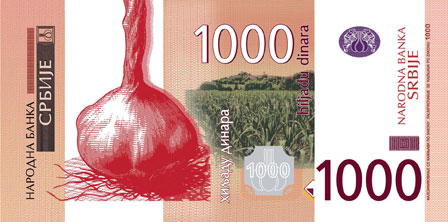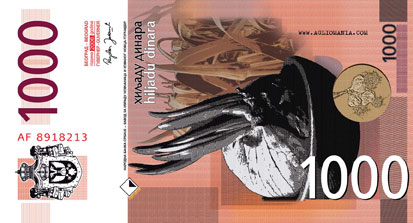… meant ironically or in quest of a new meaning ??? Clear is so far, that the headline refers to an interesting exhibition and conference just takes place right now in Novi Sad under the title ‘Wealth of Nations‘, which wants to bring together Art, Theory, Social Sciences and Economics, Cultural Studies and Finance in order to discuss the phenomenon of money within different social and historical contexts and meanings. Kristian Lukic has put together a text, which draws – to roll it up from the end – from various sources Agamben to Marx to A.Smith for the event’s announcement and it delivers a nice concise read in its attempt to grasp an understanding of ‘the system which is based on self-reference and the resulting mystification.‘
| …. According to its definition money is : a) a measure of value b) a medium of exchange and c) a medium of capital accumulation. The fact is that money is never solely money as a measure of economic value. It is a measure of value that participates in the constitution, and the control and regulation of both the material and nonmaterial (irrational or imaginary) social body/subject and its relations. From such a position, money can be viewed as the basis of social power, as the main element or measure of value, or as a symbolic or numerical abstraction. | |
| It is interesting to see that the field of Finance is really an exclusive field which is well known only to a selected group, which, like priests or shamans, functions within the global banking system. Periodical financial crises over the last two centuries (the current global crisis is apparently the thirteenth) arouse our curiosity about the mechanisms, the structure and the rules of the global system. On the one hand, the Internet is there to help with the easy dissemination of information and, on the other hand, it adds tidal waves of various conspiracy and control theories, which act as disinformation when studying the nature and the control of the spirit and the flow of money. | 
‘Garlic Dinar’ via napon.org |
| This is what Marx wrote about money in his notes ‘Power of Money’: ‘If I have no money for travel, I have no need — that is, no real and realisable need — to travel. If I have the vocation to study but no money for it, I have no vocation to study — that is, no effective, no true vocation. On the other hand, if I have really no vocation to study but have the will and the money for it, I have an effective vocation for it.’According to Marx, money, in its role of the external universal medium, transforms the real and essential power of man and nature into an abstract concept, and thus into imperfect and disturbing visions. In the same way, money transforms the real imperfections and visions, essential powers that are impotent in reality and exist only in a person’s imagination, into true essential power and capability. In view of the above, money causes a general deformity of the characteristics of the subject and makes its own attributes appear contradictory. Simmel’s Philosophy is a fundamental criticism of Marx’s political economy although both authors agree that money has various functions (measure of value, medium of exchange and medium of capital accumulation). To Marx, money is the embodiment of abstract labour, and its value is determined by the conditions of production.
Marx believed that capitalist production, with its relationship between money, labour and capital, is responsible for the contradictions of the modern, industrial society. To Simmel, on the other hand, monetary economy as such is the reason for social relationships being soulless. Simmel criticises the ‘economisation’ of money, and places money into the wider concept of human experience. To him money is only loosely connected to a material basis and is, instead, a social phenomenon, a form of human interaction. As Poggi claims, to Simmel money is the central structure and symbol in the historical formation of the modern society. Finance is simply the monetary activity of managing money. Finance is the production of monetary funds. Viewed like that, money constitutes both the means and the aim of Finance, a means that is an aim in itself and an aim without the means. Simmel believes that the ideal point of money, the same as of Law, is to be the measure of other things without measuring itself. In his book, State of exception, Agamben analyses states of emergency and claims that the means are always independent of the aim they achieve. The means do not stand in relation to the aim, positioned, instead, in relation to their own mediality. Thus Finance becomes a means without purpose and they financialize only their own financialization. The latest research claims that 97% of the total amount of dollars in circulation is virtual, they only exist as numerical information and only 3% of dollars circulating in the world is real paper money, real cash. Money as capital and capital as money operates easily within the concepts of commodification, gets integrated into life itself and slowly grows into the wider context of material, into nature and energy (ecocapitalism, energy politics). Marazzi claims that the sectors of accumulation of capital, such as Health, Education and Culture, are the ones which today generate the most revenue and create the most jobs. It is due to the fact that these services, which used to be state owned, are currently undergoing transition into the private sector. On top of that there is Ecology with its privatization and financialisation of nature. The current situation reflects the new classes and satisfactions, among which is the class of priests, brahmans, who know the secrets, the laws and the processes of the financial world. How long this has been going on without change is clear from the latest researhes into money in Antiquity. William H. Desmonde writes about money bearing divine insignia that was made in temples. Rene Guenon speaks of the symbolic elements of druidic doctrines on Celtic money. The social system has two options in this situation: either the goods and monetary system will fundamentally change or the subjects will have to start learning about the basics of Economy and Finance. Therefore it is essential to build understanding of this complex field of Finance through educating and motivating those who are not privy to financial science and its applications. The question is whether the financial system would collapse if a critical mass of subjects got to understand financial laws, if they understood the system which is based on self-reference and the resulting mystification. Kristian Lukić (link to the orginial announcement text) (Interview with Kristian Lukic by Joanne Richardson in 2001 about kuda.org) |
|

